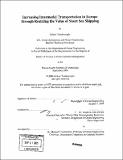| dc.contributor.advisor | Hauke L. Kite-Powell. | en_US |
| dc.contributor.author | Tenekecioglu, Goksel | en_US |
| dc.contributor.other | Massachusetts Institute of Technology. Dept. of Ocean Engineering. | en_US |
| dc.date.accessioned | 2006-07-31T15:15:03Z | |
| dc.date.available | 2006-07-31T15:15:03Z | |
| dc.date.copyright | 2005 | en_US |
| dc.date.issued | 2005 | en_US |
| dc.identifier.uri | http://hdl.handle.net/1721.1/33588 | |
| dc.description | Thesis (S.M.)--Massachusetts Institute of Technology, Dept. of Ocean Engineering, 2005. | en_US |
| dc.description | Includes bibliographical references (leaves 87-89). | en_US |
| dc.description.abstract | This thesis describes the role of short sea shipping within the transportation network in the European Union. It examines the existence of externalities relating to congestion, infrastructure, air pollution, noise, and accidents in the transportation sector. It evaluates the level of these externalities and also their effects on the Community. It then explains current attempts to internalize these factors, or incorporate them into the cost of transportation that the user pays. It concludes that current efforts are lacking and do not produce the most beneficial situation for the citizens of Europe. Consequently, the thesis investigates other possible methods of internalization that may produce more advantageous results and analyzes their possible effects on the transportation sector. The value of short sea shipping is examined in regards to the previously mentioned externalities. It concludes that, with the exception of the emission of sulfur dioxide, maritime transportation outperforms other modes of transportation by producing relatively few external effects. | en_US |
| dc.description.abstract | (cont.) The current status of the short sea shipping industry is then described, followed by a discussion of intermodal transportation and the initiative within the European Community to increase the use of intermodal transportation. Two case studies are then reviewed, which demonstrate the economy of intermodal transportation solutions compared to all-road alternatives. The thesis concludes by summarizing the benefits of short sea shipping. Some of the obstacles which prevent the realization of the full potential of short sea shipping are discussed. Suggestions for improving the current situation are included as well as a description of some of the measures adopted by the European Commission to increase the use of short sea shipping as an alternative to road transportation. | en_US |
| dc.description.statementofresponsibility | by Goksel Tenekecioglu. | en_US |
| dc.format.extent | 89 leaves | en_US |
| dc.format.extent | 5159220 bytes | |
| dc.format.extent | 5162898 bytes | |
| dc.format.mimetype | application/pdf | |
| dc.format.mimetype | application/pdf | |
| dc.language.iso | eng | en_US |
| dc.publisher | Massachusetts Institute of Technology | en_US |
| dc.rights | M.I.T. theses are protected by copyright. They may be viewed from this source for any purpose, but reproduction or distribution in any format is prohibited without written permission. See provided URL for inquiries about permission. | en_US |
| dc.rights.uri | http://dspace.mit.edu/handle/1721.1/7582 | |
| dc.subject | Ocean Engineering. | en_US |
| dc.title | Increasing intermodal transportation in Europe through realizing the value of short sea shipping | en_US |
| dc.type | Thesis | en_US |
| dc.description.degree | S.M. | en_US |
| dc.contributor.department | Massachusetts Institute of Technology. Department of Ocean Engineering | |
| dc.identifier.oclc | 63761852 | en_US |
